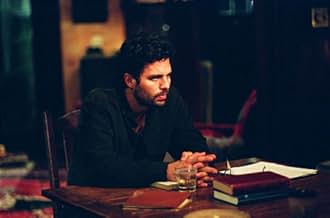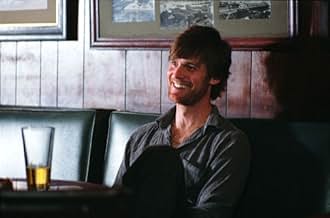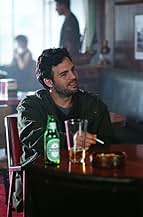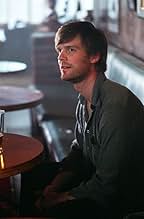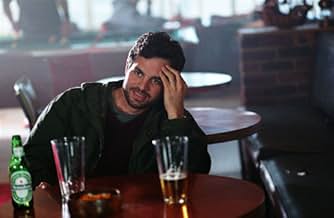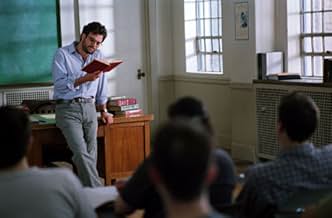An indiscretion between two close friends tears down their respective marriages.An indiscretion between two close friends tears down their respective marriages.An indiscretion between two close friends tears down their respective marriages.
- Awards
- 2 wins & 4 nominations total
- Director
- Writers
- All cast & crew
- Production, box office & more at IMDbPro
Featured reviews
Not a heart-wrenching film but illuminates with precision the dynamics of friendship, marriage and adultery. It shows a potent portrait of two couples whose marriages are going to break; has an enormous power and tells some uncomfortable truths. In this movie actions have consequences that are not resolved with a hug or a cry. The four grown-ups (as well as their children who are perfectly aware of the situation) are very talented and all deliver passionate and compulsive performances. The atmosphere lingering in the air is what impressed me the most, being the flick filled with very expressive glances and electrical silences. Mark Ruffalo and Naomi Watts always very gifted.
A serious and emotionally engaging melodrama that tells of two marriages, of love, friendship, adultery, faithfulness, parenting, and the delicate balance between being true to the spirit within and being responsible about the consequences in the real world.
Mark Ruffalo and Peter Krause play two college tutors of English literature, working away and also trying to get published in their own right in their spare time. They are close buddies and have loving, beautiful wives (Naomi Watts and Laura Dern). We have four 'ordinary people' who are far from caricatures they have sensitivities, intelligence, emotional aspiration and weakness as they struggle with their own stymied abilities to find happiness and fulfilment both for themselves and the ones they love.
We Don't Live Here Anymore looks at the reality of marriage in a less than rose-tinted light. The performances by Watts and Dern shine forth with increasing emotional intensity, and the efforts of their husbands to stage-manage some sort of acceptable compromise ricochet on the fringes of a dark despair that forever looms and threatens to engulf everyone. As the characters realise their increasingly complex shenanigans are verging on disaster, it leads them to ever deeper self-examination of their true feelings. And yet sometimes the children have a greater realisation of what's going on than do their parents. The film's closing scene ("Because I can") reminds us that the element of choice, true and ongoing, is so often lacking in marriage, sometimes even in relatively small things once marriage has been consummated, the rest becomes duty and infidelity is often driven by compulsion - so the elements of ongoing freewill (jointly and singly) can be hard to find.
This movie has been compared to Closer and rightly so it is for mature, thinking audiences who can come to terms with deep imperfections and use the depths of what it takes to be truly human to make things better (or find a way forward that has emotionally honesty). The 'moral right' will dismiss both films not so much out of a sense of superiority ('adultery never pays') but simply through lack of understanding.
The heavy-going nature of the film is alleviated by shots of rare beauty in the surrounding countryside, elegantly photographed, and by the playfulness of the several children. Watts (nearly 38 but still looking 24) and Dern (who appears older, but attractive in a very different way) each show elements of femininity that their characters are desperate to satisfy the need to be wanted and the need to be loved. To appreciate the film it is necessary to see the scenarios from both the viewpoints of the women and of the men. Everybody cares about the kids. Beyond that, the love that is expected of the spouse is at odds with the love that they try to give, so they all feel like 'objects' to their respective partners. The lack of understanding breaks down into infidelity, which (so the film might argue) can almost be a healing balm. "It's much easier living with a woman who feels loved", remarks a cuckolded husband. It's a film where no-one has all the answers (though not for want of trying) and so in some ways a testament to humanity. Sadly, many will see it as just another cynical take on dysfunctional relationships, but the open minded viewer may find a lot more, for this film is a well-made (if not exceptional) work of art that contributes more to the understanding of the human condition than any cutesy, idealised portrayal of happy families.
Mark Ruffalo and Peter Krause play two college tutors of English literature, working away and also trying to get published in their own right in their spare time. They are close buddies and have loving, beautiful wives (Naomi Watts and Laura Dern). We have four 'ordinary people' who are far from caricatures they have sensitivities, intelligence, emotional aspiration and weakness as they struggle with their own stymied abilities to find happiness and fulfilment both for themselves and the ones they love.
We Don't Live Here Anymore looks at the reality of marriage in a less than rose-tinted light. The performances by Watts and Dern shine forth with increasing emotional intensity, and the efforts of their husbands to stage-manage some sort of acceptable compromise ricochet on the fringes of a dark despair that forever looms and threatens to engulf everyone. As the characters realise their increasingly complex shenanigans are verging on disaster, it leads them to ever deeper self-examination of their true feelings. And yet sometimes the children have a greater realisation of what's going on than do their parents. The film's closing scene ("Because I can") reminds us that the element of choice, true and ongoing, is so often lacking in marriage, sometimes even in relatively small things once marriage has been consummated, the rest becomes duty and infidelity is often driven by compulsion - so the elements of ongoing freewill (jointly and singly) can be hard to find.
This movie has been compared to Closer and rightly so it is for mature, thinking audiences who can come to terms with deep imperfections and use the depths of what it takes to be truly human to make things better (or find a way forward that has emotionally honesty). The 'moral right' will dismiss both films not so much out of a sense of superiority ('adultery never pays') but simply through lack of understanding.
The heavy-going nature of the film is alleviated by shots of rare beauty in the surrounding countryside, elegantly photographed, and by the playfulness of the several children. Watts (nearly 38 but still looking 24) and Dern (who appears older, but attractive in a very different way) each show elements of femininity that their characters are desperate to satisfy the need to be wanted and the need to be loved. To appreciate the film it is necessary to see the scenarios from both the viewpoints of the women and of the men. Everybody cares about the kids. Beyond that, the love that is expected of the spouse is at odds with the love that they try to give, so they all feel like 'objects' to their respective partners. The lack of understanding breaks down into infidelity, which (so the film might argue) can almost be a healing balm. "It's much easier living with a woman who feels loved", remarks a cuckolded husband. It's a film where no-one has all the answers (though not for want of trying) and so in some ways a testament to humanity. Sadly, many will see it as just another cynical take on dysfunctional relationships, but the open minded viewer may find a lot more, for this film is a well-made (if not exceptional) work of art that contributes more to the understanding of the human condition than any cutesy, idealised portrayal of happy families.
"We Don't Live Here Anymore" is a sophisticated examination of the complexities of the difficult relationship that is contemporary marriage and family.
As it takes us awhile in the beginning to figure out who is attached in what couple, Mark Ruffalo, Laura Dern, Peter Krause and Naomi Watts superbly act a matched quartet of grown-up friends whose restlessness and frustrations with their personal and professional lives are gradually torn to shreds by propinquity and alcohol (and perhaps by community college teachers having too flexible schedules and temptations). The suspense comes in the revelation of the layers that get peeled off each and we wonder just how far each will go.
Each actor finds a unique response to their character's emotional situation and the production design well illustrates their individuality (though once again in a film I got fooled that I was supposed to think ill of a character like Dern's whose comfortable house is evidently a mess when it looks like mine, while I thought Watts' house was really cold in its spotlessness while gradually I realized I was supposed to think she was more together, but heck she had one less kid).
While I haven't read yet the two Andre Dubos short stories that Larry Gross adapted for the screenplay, Ruffalo's voice-over is used inconsistently as an occasional crutch to reveal inner thoughts probably to help bolster the denouement; otherwise the camera angles try to convey their thoughts, but that manipulates the audience a bit as to whom to root for.
Maryse Alberti's cinematography richly conveys summer passing in a beautiful yet claustrophobic college town.
The song selections are not particularly revelatory, but the music is effective at mood-setting.
As it takes us awhile in the beginning to figure out who is attached in what couple, Mark Ruffalo, Laura Dern, Peter Krause and Naomi Watts superbly act a matched quartet of grown-up friends whose restlessness and frustrations with their personal and professional lives are gradually torn to shreds by propinquity and alcohol (and perhaps by community college teachers having too flexible schedules and temptations). The suspense comes in the revelation of the layers that get peeled off each and we wonder just how far each will go.
Each actor finds a unique response to their character's emotional situation and the production design well illustrates their individuality (though once again in a film I got fooled that I was supposed to think ill of a character like Dern's whose comfortable house is evidently a mess when it looks like mine, while I thought Watts' house was really cold in its spotlessness while gradually I realized I was supposed to think she was more together, but heck she had one less kid).
While I haven't read yet the two Andre Dubos short stories that Larry Gross adapted for the screenplay, Ruffalo's voice-over is used inconsistently as an occasional crutch to reveal inner thoughts probably to help bolster the denouement; otherwise the camera angles try to convey their thoughts, but that manipulates the audience a bit as to whom to root for.
Maryse Alberti's cinematography richly conveys summer passing in a beautiful yet claustrophobic college town.
The song selections are not particularly revelatory, but the music is effective at mood-setting.
John Curran presents a very unsettling view on fragile relationships. At the centre of the story there are two married couples and from their interactions one can easily conclude that there was once a lot of love within the couples and a strong friendship between them and now, well in the case of Hank and Edith, the love is vanishing into thin air. Edith still yearns for Hank's love but Hank is too self-absorbed in his self-perceived failure and careless about his wife's infidelity. Terry still deeply loves Jack who is going through a mid-life crisis (like Hank) and finds comfort, both sexual and emotional, with Edith. At the center of their relationships are the children of the respective couples who are the most vulnerable ones. The film is a shocking portrayal of relationships and friendships that have reached a stage where indifference, obligation, guilt, loneliness and despair take over. Curran also adds some doses of humour that is subtle and welcoming (at the same time non-intrusive).
The cinematography is fantastic and editing is wonderful. I especially liked how the camera jumps from one character to another, showing what they are going through, during a constant time period. The score contributes to the gloominess but in a non-intrusive and non-melodramatic way. It is rather gentle and flowing smoothly.
'We Don't Live Here Anymore' showcases four exceptional performances. Ruffalo is both hateful and sympathetic as Jack. The remarkable Laura Dern is explosive and fiery as Terry. Her Terry is the strongest of the four and Dern is both gripping and haunting. Both Ruffalo and Dern benefit from well-defined roles (but even otherwise they are great actors as has been evident in their other movies) though there was the risk that had the roles been played by lesser actors, they could have easily become caricatures. However, the characters Hank and Edith depend more on the actor's performances. Naomi Watts shows immense depth through a wonderfully restrained performance while Peter Krause brilliantly downplays and brings a rawness to his part and his facial expressions speak volumes.
'We Don't Live Here Anymore' is certainly not a positive look at relationships. The friendship between the couple is strong and there is an understanding between them that shows that they care for each other. Notice in the later scene when Dern's Terry tries to comfort Watts's Edith and the chats between Hank and Jack are proof enough. Even though the words aren't said, they only know each other too well and maybe it is respect that is losing its hold and probably friendship will too. Curran's film tells a meaningful raw story that is honest, brutal, daring and unsympathetic to its characters.
The cinematography is fantastic and editing is wonderful. I especially liked how the camera jumps from one character to another, showing what they are going through, during a constant time period. The score contributes to the gloominess but in a non-intrusive and non-melodramatic way. It is rather gentle and flowing smoothly.
'We Don't Live Here Anymore' showcases four exceptional performances. Ruffalo is both hateful and sympathetic as Jack. The remarkable Laura Dern is explosive and fiery as Terry. Her Terry is the strongest of the four and Dern is both gripping and haunting. Both Ruffalo and Dern benefit from well-defined roles (but even otherwise they are great actors as has been evident in their other movies) though there was the risk that had the roles been played by lesser actors, they could have easily become caricatures. However, the characters Hank and Edith depend more on the actor's performances. Naomi Watts shows immense depth through a wonderfully restrained performance while Peter Krause brilliantly downplays and brings a rawness to his part and his facial expressions speak volumes.
'We Don't Live Here Anymore' is certainly not a positive look at relationships. The friendship between the couple is strong and there is an understanding between them that shows that they care for each other. Notice in the later scene when Dern's Terry tries to comfort Watts's Edith and the chats between Hank and Jack are proof enough. Even though the words aren't said, they only know each other too well and maybe it is respect that is losing its hold and probably friendship will too. Curran's film tells a meaningful raw story that is honest, brutal, daring and unsympathetic to its characters.
Director John Curran's "We Don't Live Here Anymore" is a continuously sizzling, attention-holding drama about two couples - best friends - who are perched precariously in twisted relationships that threaten their marriages and imperil the security of their children.
Jack Linden (Mark Ruffalo) is married to Terry (Laura Dern) and they have two small children, a boy and a girl. Their closest friends, with whom they spend much (too much from my popcorn-munching perspective) time, are Hank Evans (Peter Krause) and Edith (Naomi Watts). They've got one pre-teen daughter. Jack and Hank teach English literature and creative writing at a small college in the rural area where they live. Both aspire to be published authors of fiction.
Jack has a torrid affair going with Edith, who feels neglected by her husband. Maybe at heart she simply doesn't like him anymore, much less love him. Hank's a fellow who thinks that free love is a guiltless and fine option that should co-exist with marriage. He doesn't care if Edith engages in adulterous liaisons, a normal part of his married life. Actually he's an empty-headed ass. He certainly isn't in tune with contemporary legal standards about refraining from sexually-laced comments to female students. In addition to being an ass, it's fair to say he's a pig too.
Terry suspects the affair while also being pursued by Hank. Hank the skirt-chaser is imbued with a touch of sociopathy. No evidence of conscience or feelings about the harm he might wreak disturbs his calm mien. Kudos to Peter Krause for investing Hank with such single-minded devotion to self-gratification that the viewer constantly wonders, "He's got to be a mensch, finally, no?" No.
Terry and Jack's marriage is in a rut. Terry imbibes too much and as contrasted to Edith, as a housewife she's a bit of a sloven, a trait for which she's excessively berated by Jack. Ruffalo is alternately sympathetic and repelling as a guy auto-fast-forwarded to his mid-life crisis.
Surprise-as the relationships become more complex, psychologically and sexually, the kids, all three of them, are in the middle. Only Terry seems to understand, with the desperateness of a shipwrecked sailor clinging to a plank, that preserving her marriage is in her kids' best interests if not necessarily her own.
Naomi Watts, who co-produced the movie, is beautiful and her dalliance with Jack is, for her, much more than a regular tumble for sexual diversity. She's alternately funny and deeply wistful, not fully in control of her world. A fine acting job.
But the emotional core of "We Don't Live Here Anymore" is the stunningly brilliant, ever remarkable Laura Dern, one of the greatest (and shamefully most underemployed) actresses working today. Dern's Terry is confused and desperate at times but her strongest, most ferocious belief is that the center must hold. Her center is her marriage and kids. And she loves Jack as no one else can and as he is too blind to appreciate.
Dern deserves an Oscar nomination for her fierce, gripping performance. Her facial expressions and her desperate pleading with Jack reflect a woman who isn't so much afraid of a marital breakup as she is hauntingly, achingly aware of what it will do to their kids. Pursued by Hank, rejected by Jack, Dern's Terry wavers but always hangs on to an inner strength the other three protagonists never had.
"Bob & Carol and Ted & Alice" decades ago parodied the sexual revolution that included, for some, mate swapping and adultery as - almost - a rite of passage for young, well-educated, affluent couples. "We Don't Live Here Anymore" updates the pseudo-sophistication of that portrayal and blazingly shows the human cost that may or may not make adultery worthwhile. The end here is as reassuring as viewers want (or need) it to be.
The cinematography is excellent. The score, ranging from Beethoven's Symphony No. 1 to bagpipe music to an almost minimalist accompaniment to critical scenes, is well integrated with Larry Cross's crisp screenplay. The original short stories by Andre Dubos are well adapted.
A powerful film, "We Don't Live Here Anymore" takes what could have been a "B" soap opera and through the brilliant acting of the quartet of leading characters brings to life an absorbing and meaningful story.
9/10
Jack Linden (Mark Ruffalo) is married to Terry (Laura Dern) and they have two small children, a boy and a girl. Their closest friends, with whom they spend much (too much from my popcorn-munching perspective) time, are Hank Evans (Peter Krause) and Edith (Naomi Watts). They've got one pre-teen daughter. Jack and Hank teach English literature and creative writing at a small college in the rural area where they live. Both aspire to be published authors of fiction.
Jack has a torrid affair going with Edith, who feels neglected by her husband. Maybe at heart she simply doesn't like him anymore, much less love him. Hank's a fellow who thinks that free love is a guiltless and fine option that should co-exist with marriage. He doesn't care if Edith engages in adulterous liaisons, a normal part of his married life. Actually he's an empty-headed ass. He certainly isn't in tune with contemporary legal standards about refraining from sexually-laced comments to female students. In addition to being an ass, it's fair to say he's a pig too.
Terry suspects the affair while also being pursued by Hank. Hank the skirt-chaser is imbued with a touch of sociopathy. No evidence of conscience or feelings about the harm he might wreak disturbs his calm mien. Kudos to Peter Krause for investing Hank with such single-minded devotion to self-gratification that the viewer constantly wonders, "He's got to be a mensch, finally, no?" No.
Terry and Jack's marriage is in a rut. Terry imbibes too much and as contrasted to Edith, as a housewife she's a bit of a sloven, a trait for which she's excessively berated by Jack. Ruffalo is alternately sympathetic and repelling as a guy auto-fast-forwarded to his mid-life crisis.
Surprise-as the relationships become more complex, psychologically and sexually, the kids, all three of them, are in the middle. Only Terry seems to understand, with the desperateness of a shipwrecked sailor clinging to a plank, that preserving her marriage is in her kids' best interests if not necessarily her own.
Naomi Watts, who co-produced the movie, is beautiful and her dalliance with Jack is, for her, much more than a regular tumble for sexual diversity. She's alternately funny and deeply wistful, not fully in control of her world. A fine acting job.
But the emotional core of "We Don't Live Here Anymore" is the stunningly brilliant, ever remarkable Laura Dern, one of the greatest (and shamefully most underemployed) actresses working today. Dern's Terry is confused and desperate at times but her strongest, most ferocious belief is that the center must hold. Her center is her marriage and kids. And she loves Jack as no one else can and as he is too blind to appreciate.
Dern deserves an Oscar nomination for her fierce, gripping performance. Her facial expressions and her desperate pleading with Jack reflect a woman who isn't so much afraid of a marital breakup as she is hauntingly, achingly aware of what it will do to their kids. Pursued by Hank, rejected by Jack, Dern's Terry wavers but always hangs on to an inner strength the other three protagonists never had.
"Bob & Carol and Ted & Alice" decades ago parodied the sexual revolution that included, for some, mate swapping and adultery as - almost - a rite of passage for young, well-educated, affluent couples. "We Don't Live Here Anymore" updates the pseudo-sophistication of that portrayal and blazingly shows the human cost that may or may not make adultery worthwhile. The end here is as reassuring as viewers want (or need) it to be.
The cinematography is excellent. The score, ranging from Beethoven's Symphony No. 1 to bagpipe music to an almost minimalist accompaniment to critical scenes, is well integrated with Larry Cross's crisp screenplay. The original short stories by Andre Dubos are well adapted.
A powerful film, "We Don't Live Here Anymore" takes what could have been a "B" soap opera and through the brilliant acting of the quartet of leading characters brings to life an absorbing and meaningful story.
9/10
Did you know
- TriviaThe Irish step dance scene starts with a cutaway where the center dancer is actually a male dancer.
- Quotes
[last lines]
Edith Evans: I'm not leaving you because you're unfaith Hank, I'm leaving because I was.
Hank Evans: Look, none of that matters any more. It's over. Isn't it? Isn't it, Edith?
Edith Evans: Yeah. It's over.
Hank Evans: Well then, why leave now?
Edith Evans: Because I can.
- Crazy creditsSpecial Thanks To Christine & Ben Christine, Terry & Kelly Kris & Fisher
- ConnectionsFeatured in The 20th IFP Independent Spirit Awards (2005)
- SoundtracksJungle Warrior
Written by John Otieno
Performed by Matata
Courtesy of President Records Ltd. UK
- How long is We Don't Live Here Anymore?Powered by Alexa
Details
- Release date
- Countries of origin
- Official sites
- Language
- Also known as
- La Tentación
- Filming locations
- Production companies
- See more company credits at IMDbPro
Box office
- Budget
- $3,000,000 (estimated)
- Gross US & Canada
- $2,041,014
- Opening weekend US & Canada
- $101,295
- Aug 15, 2004
- Gross worldwide
- $3,361,213
- Runtime1 hour 41 minutes
- Color
- Sound mix
- Aspect ratio
- 2.35 : 1
Contribute to this page
Suggest an edit or add missing content



